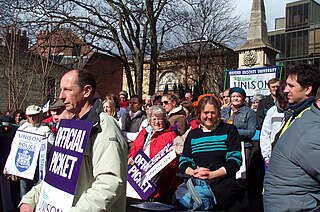Related Research Articles

A trade union is an association of workers forming a legal unit or legal personhood, usually called a "bargaining unit", which acts as bargaining agent and legal representative for a unit of employees in all matters of law or right arising from or in the administration of a collective agreement. Labour unions typically fund the formal organization, head office, and legal team functions of the labour union through regular fees or union dues. The delegate staff of the labour union representation in the workforce are made up of workplace volunteers who are appointed by members in democratic elections.

The International Confederation of Free Trade Unions (ICFTU) was an international trade union. It came into being on 7 December 1949 following a split within the World Federation of Trade Unions (WFTU), and was dissolved on 31 October 2006 when it merged with the World Confederation of Labour (WCL) to form the International Trade Union Confederation (ITUC).

The General Confederation of Labour is a national trade union center, founded in 1895 in the city of Limoges. It is the first of the five major French confederations of trade unions.

The French Democratic Confederation of Labour is a national trade union center, one of the five major French confederations of trade unions, led since 2012 by Laurent Berger. It is the largest French trade union confederation by number of members (875,000) but comes only second after the Confédération générale du travail (CGT) in voting results for representative bodies.

The Australian Council of Trade Unions (ACTU) is the largest peak body representing workers in Australia. It is a national trade union centre of 46 affiliated unions and eight trades and labour councils. The ACTU is a member of the International Trade Union Confederation.
The Barbados Labour Party (BLP) is the main party of government of Barbados which was established in 1938. Led by Prime Minister Mia Amor Mottley, the BLP holds 29 of the 30 seats in the House of Assembly of Barbados after MP for St. Michael West, Joseph Artherly decided to become an Independent MP and became the Leader of the Opposition. It was elected to government on 25 May 2018 after 10 years in opposition, with Mottley becoming the country's first female Prime Minister.

The Swedish Trade Union Confederation, commonly referred to as LO, is a national trade union centre, an umbrella organisation for fourteen Swedish trade unions that organise mainly "blue-collar" workers. The Confederation, which gathers in total about 1.5 million employees out of Sweden's 10 million people population, was founded in 1898 by blue-collar unions on the initiative of the 1897 Scandinavian Labour Congress and the Swedish Social Democratic Party, which almost exclusively was made up by trade unions. In 2018 union density of Swedish blue-collar workers was 59%, a decline by eighteen percentage points since 2006. A strongly contributing factor was the considerably raised fees to union unemployment funds in January 2007 made by the new centre-right government.
Catholic Church and politics aims to cover subjects of where the Catholic Church and politics share common ground.

The Bharatiya Mazdoor Sangh is one of the trade union organization in India. It was founded by Dattopant Thengadi on 23 July 1955.

Trade unions in the United Kingdom were first decriminalised under the recommendation of a Royal Commission in 1867, which agreed that the establishment of the organisations was to the advantage of both employers and employees. Legalised in 1871, the Trade Union Movement sought to reform socio-economic conditions for working men in British industries, and the trade unions' search for this led to the creation of a Labour Representation Committee which effectively formed the basis for today's Labour Party, which still has extensive links with the Trade Union Movement in Britain. Margaret Thatcher's governments weakened the powers of the unions in the 1980s, in particular by making it more difficult to strike legally, and some within the British trades union movement criticised Tony Blair's Labour government for not reversing some of Thatcher's changes. Most British unions are members of the TUC, the Trades Union Congress, or where appropriate, the Scottish Trades Union Congress or the Irish Congress of Trade Unions, which are the country's principal national trade union centres.

A company or "yellow" union is a worker organization which is dominated or influenced by an employer, and is therefore not an independent trade union. Company unions are contrary to international labour law. They were outlawed in the United States by the 1935 National Labor Relations Act §8(a)(2), due to their use as agents for interference with independent unions. Company unions persist in many countries, particularly with authoritarian governments.
Trade unions in South Africa have a history dating back to the 1880s. From the beginning unions could be viewed as a reflection of the racial disunity of the country, with the earliest unions being predominantly for white workers. Through the turbulent years of 1948–1991 trade unions played an important part in developing political and economic resistance, and eventually were one of the driving forces in realising the transition to an inclusive democratic government.
The Fifth Labour Government of New Zealand was the government of New Zealand from 10 December 1999 to 19 November 2008. Labour Party leader Helen Clark negotiated a coalition with Jim Anderton, leader of the Alliance Party and later the Progressive Party, and New Zealand First. While undertaking a number of substantial reforms, it was not particularly radical compared to previous Labour governments.
Trade unions in Benin operate in relative freedom, with approximately 75% of the formal sector being unionized. There are, however, concerns expressed by the International Labour Organization (ILO) and the International Trade Union Confederation (ITUC) about the discrepancies between the government's Labour Code and the labour practices outlined by ILO Conventions 87 and 98 - specifically the right of unions to form without government approval, the right of seafarers to organize or strike, and restrictions on strikes.
Trade unions in Botswana operate within a longstanding democratic system in which the government of Botswana has ratified the International Labour Organization's core conventions, including Conventions 87 and 98.

The Civil and Public Services Association (CPSA) was a trade union in the United Kingdom, representing civil servants.

The Confederation of Canadian Unions, or CCU is a national trade union center, a central labour body of independent unions in Canada.
Socialism in the United Kingdom is thought to stretch back to the 19th century from roots arising in the aftermath of the English Civil War. Notions of socialism in Great Britain have taken many different forms from the utopian philanthropism of Robert Owen through to the reformist electoral project enshrined in the birth of the Labour Party.

The labour movement or labor movement consists of two main wings, the trade union movement or labor union movement, also called trade unionism or labor unionism on the one hand, and the political labour movement on the other.
References
- ↑ 2008 Annual Survey of violations of trade union rights Archived 2008-12-24 at the Wayback Machine